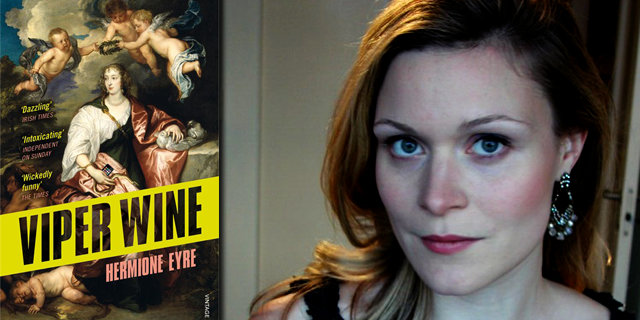Hermione will be taking part in the Walter Scott shortlist discussion event at the Borders Book Festival on Saturday 13 June at 3.15pm
You can also see Hermione at the Walter Scott Prize award ceremony on Saturday 13 June at 5.15pm

25th May, 2015
What do you think about being shortlisted for the Walter Scott Prize for Historical Fiction? Do you see yourself as a historical novelist?
I am delighted that Viper Wine has been recognized by the Walter Scott Prize. It’s a great honour. Yes, I am proud to consider myself a historical novelist. When I was immersed in writing Viper Wine, the 1630s felt as real to me as the present day, and I worked this into the novel. It’s a gloriously adaptable genre and Viper Wine subverts the “correct” historical novel by introducing anachronisms, slips and baroque fancies. For example, my main character, the real-life 17th century alchemist Sir Kenelm Digby, hums David Bowie while catching moonbeams in his laboratory.
The Judges were excited by your experimental style. Did you deliberately want to mash up past and present or did that just happen?
The anachronisms were inspired by TS Eliot’s Burnt Norton – “Time future contained in time past”. But they’re also there for fun. I liked the tingle they gave me when I read them back – a jarring effect, like the deliberate dissonance in baroque music, and slightly hallucinogenic (opium is a key ingredient of Viper Wine, the beauty potion my characters are drinking). I don’t think the historical novel is well served by writers treating the genre with too much reverence. Yes, I loved doing research, visiting the Wellcome Trust library and the British Library Rare Books – but having done that I gained a new momentum from slipping in a Wagon Wheel here, a radio mast there. I think the preoccupations of the time of writing are always going to come to the surface of a historical novel and rather than commit the gauche and distorting act of doing this accidentally, I decided to make a feature of it, tracing the sublime and comic correspondences and ruptures between the past and the present.
How did the people and times you write about first lodge in your imagination?
In Dulwich Picture Gallery there is a wonderful painting by Anthony Van Dyck of Venetia, Lady Digby on her Death-bed (1633). When I saw it five years ago, I needed to know more than could be contained on the little plaque next to it. Had she really died from drinking the beauty potion Viper Wine? Why was her husband Sir Kenelm known as “the ornament of England”? My love of the English renaissance was probably laid down much earlier, when I was taken to see Ben Jonson comedies at an unsuitably young age. I think learning some Shakespeare as a child helped too. The language gets into your veins.
At which point do you let fiction take over from your research?
My favourite research tool, the OED online, was a constant companion. If I wanted to find exactly the right variant of1633 slang for “slapper”, for example, I could choose from doll, katy, fricatrice, rumbelow, open-tail, flap, amorosa, puffkin…. I enjoyed my research so much I put some of it on display in the novel. In Viper Wine I include quotations from sources such as John Aubrey so readers can, if they wish, differentiate accepted historical fact from my fictional inventions.
Hermione Eyre’s book Viper Wine is published by Jonathan Cape.
Hermione will be taking part in the Walter Scott shortlist discussion event at the Borders Book Festival on Saturday 13 June at 3.15pm
You can also see Hermione at the Walter Scott Prize award ceremony on Saturday 13 June at 5.15pm